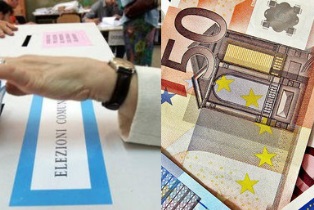
 Francesca Papasergi
Francesca Papasergi
Italian politics: A huge taxation with a strange representation
- WTI Magazine #12 Jan 09, 2014
-

 Francesca Papasergi
Francesca Papasergi
WTI Magazine #12 2014 Jan, 10
Author : Francesca Papasergi Translation by:
High school history books usually introduce the American Revolution with one of the better-known ellipsis ever pronouced. Indeed, no taxation without representation, the old Tea Party's core philosophy, would be suitable for the Italian current scenario. The boot-shaped country's ongoing administration is ablaze by two main issues: taxes and election law.
According to the European Union Directorate-General for Statistics (Eurostat), in 2011 the total tax-to-GDP ratio stood at 42.5 %. Italy's overall tax burden ranks sixth highest in the EU, exceeding the EU-27 average by 3.7% and the euro area average by 3.0%; the labor's implicit tax rate stands at 42.3% and is the second highest in the EU. On the contrary, Italy's public services and infrastructures don't have Danish or Swedish standards, not nearly. There are many expressions that could make this long story short, and they are all typical of the last thirty years' Italian social and political background. Lack of structural reforms, loss of competitiveness, unemployment, stagflation, low salaries, decreasing purchasing power, rampant corruption. All these negative features brought Italy on the verge of a fiscal cliff that is devastating what used to be one of the healthiest economies in the world, and the government keeps treating the patient with the old therapy: taxes. In these days, the public debate is concentrating on Service Tax (Tassa sui Servizi Indivisibili – TASI) that should replace the Unique Municipal Tax (Imposta Municipale Unica – IMU), that had previously replaced the Municipal Tax on Real Estate (Imposta Comunale sugli Immobili) ICI. Pretty complicated, isn't it? Moreover, Italians are still groping in the dark. How will it work? Who will pay it? Taxes come by mysterious ways.
The representation side is not living a good moment neither. The election law's writer himself, the Northern League's Mr. Roberto Calderoli, defined his creation as junk¹, and the Porcellum didn't work properly since the beginning.
In spite of their constitutional rights, people can't choose their own representatives: they can just put an X on a symbol and hope their party to decide for the best. In fact, if the party doesn't allow primary elections, its leaders can fill the lists to their liking. In addition, the huge majority prize² didn't push the country into a better governability and the Porcellum had been considered the parties' attempt to steal the power of voters since 2006, the year it became effective.
The party-lists don't let people choose their own representatives, because they are filled by leaders, and the huge "majority prize" didn't push the country into a better governability.
Given the Corte Costituzionale³ verdict, the election law is not in compliance with the Constitution. The Beppe Grillo's movement claims that the whole parliament is illegitimate. Restoring the old law, known as Mattarellum; adopting a Spanish-inspired system, made of small voting constituencies; establishing a two-round system, like the mayoral elections: these are the brand new Democratic Party's Secretary Matteo Renzi different offers to the opposition. Even if Mr. Renzi tries to make it fast, the dispute won't be settled in a day because of the contentions among parties and it could take months to find an agreement.
If taxes come by mysterious ways, the election laws often walk the rutty ones.
Everyone says things will change. They must change, because Italy needs fresh air to restart its rusty engine, and it needs it fast. Does it take an old-fashion kind of American revolution? I don't know, nobody can say that. Given Italians' hate for taxes, it would be worth a try.
______________________________________________
¹ In Italian slang, the word "porcata" derives from "porco", pig. The law was named Porcellum.
² After the main proportional distribution of seats, the "majority prize" part of them is automatically assigned to the winner.
³ It can be called Supreme Court like the American ne, but it has different duties and aims in Italy.